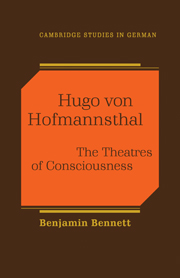Book contents
- Frontmatter
- Contents
- Preface
- Acknowledgments
- List of Abbreviations
- Part I Principles of lyric and drama
- 1 Kleist's puppets
- 2 Language as poetry
- 3 The smallest world theater
- 4 Death and the fools
- 5 Idea, reality and play-acting in Der Tor und der Tod
- 6 Theatrical philosophy: from Der Tor und der Tod to Theater in Versen
- Part II Language and society
- Part III Culture and collapse
- Conclusion
- Notes
- Index of works
- General index
6 - Theatrical philosophy: from Der Tor und der Tod to Theater in Versen
Published online by Cambridge University Press: 04 August 2010
- Frontmatter
- Contents
- Preface
- Acknowledgments
- List of Abbreviations
- Part I Principles of lyric and drama
- 1 Kleist's puppets
- 2 Language as poetry
- 3 The smallest world theater
- 4 Death and the fools
- 5 Idea, reality and play-acting in Der Tor und der Tod
- 6 Theatrical philosophy: from Der Tor und der Tod to Theater in Versen
- Part II Language and society
- Part III Culture and collapse
- Conclusion
- Notes
- Index of works
- General index
Summary
I will take up Der Tor und der Tod once more, and go over the ground again with a view to showing how the phase represented by this play is superseded in Hofmannsthal's development. This type of argument will occur repeatedly as we go on, and always involves a certain ambivalence. For supersedure, in Hofmannsthal's career, never has unequivocally the character of progress; as much is lost as is gained at each step, and there is no climax in this biographical drama. There is only the operation of an incorruptible self-criticism which, with every wounding of itself, opens for itself, and for us, new perspectives upon the problematics of literature.
Thirty years after the composition of Der Tor und der Tod, Hofmannsthal was content to have the work classified as a “lyrical drama”; and in a letter of this period, to Marie Luise Borchardt, he classifies all his dramatic production “vom ‘Tor und Tod’ bis zum ‘Abenteurer’” as strictly non-theatrical poetry (H/RB, p. 178). Perhaps we need not take this letter too seriously; not only had the intervening decades brought considerable development in Hofmannsthal's definition of “drama,” but the letter is also meant as consolation for the stage failure of Rudolf Borchardt's Verkündigung, thus directed ad hominem, not ad rem. Still, there is evidence that even in the years 1897–1900, Hofmannsthal had begun to distinguish strictly between lyrical and theatrical drama, and to relegate his own earlier works to the former category.
- Type
- Chapter
- Information
- Hugo von HofmannsthalThe Theaters of Consciousness, pp. 82 - 102Publisher: Cambridge University PressPrint publication year: 1988



